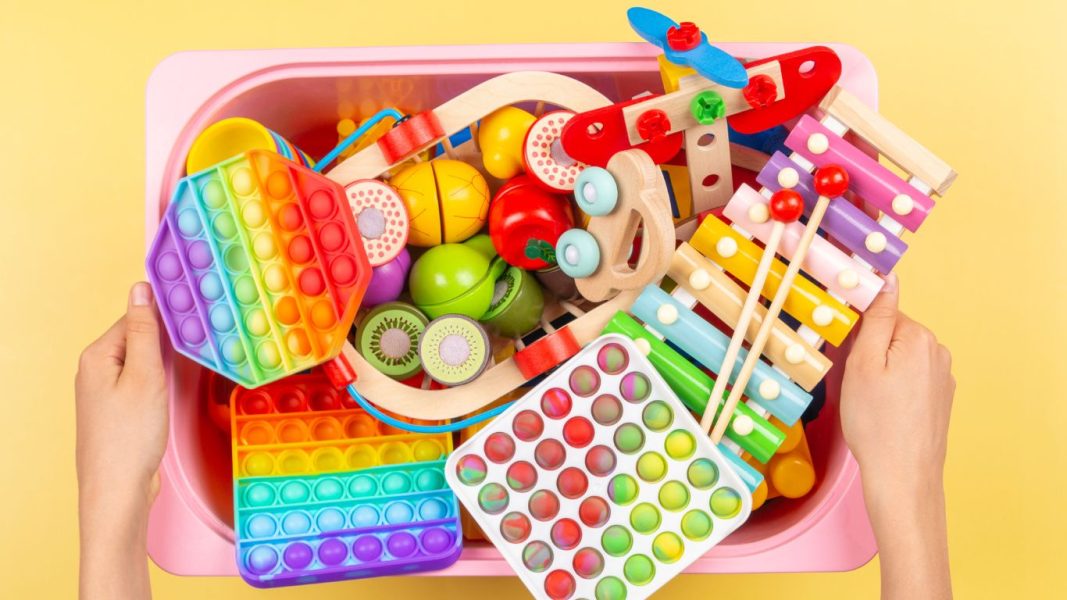In this blog, we will explore the reasons behind why some parents buy a large number of toys for their children and shed light on the developmental advantages it can offer. And buying many toys doesn’t mean those parents are not spending quality time with their kids. We’ll also discuss the importance of balance and alternative ways to support a child’s development if affordability is a concern.
As parents, we understand the importance of investing our time and attention in our children’s lives. The quote, “Give your time rather than toys,” reminds us that quality interactions and meaningful experiences hold greater value than material possessions alone. It emphasizes the significance of fostering emotional connections, engaging in conversations, and participating in activities that promote bonding and growth.
While this quote encourages us to prioritize our presence over excessive materialism, it’s essential to recognize that buying many toys is not inherently negative. If parents have the means to afford a large number of toys for their children, it can be an avenue for joy, exploration, and learning. Toys can serve as catalysts for creativity, imagination, and skill development.
Strike A Balance
It’s crucial to strike a balance and ensure that toys are not the sole source of entertainment or development in a child’s life. They should complement, rather than replace, meaningful interactions and quality time spent together. Engaging in activities that foster curiosity, communication, and exploration can help deepen the parent-child bond and contribute to a well-rounded upbringing.
For parents who may face financial constraints and cannot buy a large number of toys, it’s important to remember that there are numerous alternative ways to support a child’s development. Simple, everyday objects can be transformed into imaginative playthings, and the power of storytelling, reading books together, or engaging in outdoor adventures remains invaluable. By redirecting our focus to interactive experiences and nurturing relationships, we create opportunities for growth and learning that extend far beyond the toy box.
In essence, the quote reminds us that the love, attention, and time we invest in our children are the most precious gifts we can offer. It encourages us to prioritize the emotional connection and create a nurturing environment that fosters their holistic development. While buying many toys can bring joy and excitement, it’s the combination of our presence and the intentional moments we share that truly shape their lives for the better.
Avoid Judgment towards Parents if they are Buying Many Toys
Let us embrace the positive side of parents buying a large number of toys, acknowledging the benefits they can bring, while also recognizing that our time and presence are the greatest gifts we can give to our children. Together, let’s create a harmonious balance, where toys serve as tools for growth and connection, and our love and guidance remain the cornerstone of their happiness and fulfillment. Here are some benefits of having toys!
📣 Loved what you read? Want to go deeper into conscious parenting? ✨ The Power of Manifestation in Parenting is now available — A soulful guide packed with real-life tools like affirmations, energy shifts, and sleep talk that I personally use with my son, Hitarth. 💛 Start your journey toward calmer, connected parenting today. 🎉 Launch Offer: Only ₹99 (limited-time price!) 📲 Instant download. No waiting. 👉 Grab your copy now!.
Fostering Creativity and Imagination
A wide variety of toys can stimulate your child’s creativity and imagination. From building blocks to dolls, each toy offers unique opportunities for exploration and self-expression. By providing a diverse collection of toys, parents can nurture their child’s cognitive and imaginative development.
Example
Let’s dive into the world of Hitarth, who has discovered a world of endless possibilities through his independent play sessions. Hitarth’s toys of choice? Magna Tiles and building blocks. These simple yet versatile toys have become the key to unlocking his boundless creativity and captivating his imagination for hours on end.
We, as Hitarth’s parents have witnessed his deep fascination with construction and design, and we have lovingly provided him with a diverse collection of Magna Tiles and an array of building blocks. With these tools at his fingertips, Hitarth immerses himself in a world of creativity and self-expression.
Encouraging Social Interaction and Skill Development
Toys serve as valuable tools for promoting social interaction and cooperation among children. When kids have access to a variety of toys, they can engage in shared play experiences, taking turns, negotiating roles, and collaborating on imaginative adventures. This helps them develop vital social skills, such as empathy, communication, and teamwork.
Example
Consider a tea set. Playing with it allows children to engage in pretend play, taking on roles like a host, a guest, or even a chef. This type of play encourages social interaction as they learn to communicate with their playmates, share responsibilities, and cooperate to create a delightful tea party experience.
Nurturing Curiosity and Skill Development
Different toys cater to various aspects of child development. By offering a wide range of toys, parents can provide opportunities for their children to develop and refine different skills. Each toy contributes to a specific area of growth, whether it’s fine motor skills, problem-solving abilities, language development, or spatial awareness.
Example
Educational toys, such as puzzles, enhance a child’s cognitive skills, pattern recognition, and problem-solving abilities. As they engage in puzzle-solving, they learn to analyze shapes, match colors, and develop logical thinking skills.
Let’s take the case of Hitarth, a curious and eager learner who finds joy in engaging with educational toys. His toy collection includes seek-and-find games, “What’s Next” puzzles, and a set of flashcards featuring flags of different countries. The “What’s Next” puzzles provide Hitarth with a platform to develop his logical thinking skills and problem-solving abilities. With each puzzle he solves, he learns to analyze sequences, identify patterns, and make predictions. These skills not only enhance his cognitive abilities but also lay a strong foundation for mathematical and analytical thinking in the future.
Hitarth spends hours engrossed in these educational toys, eagerly searching for hidden objects, solving sequence puzzles, and familiarizing himself with the flags of countries from around the world. We are amazed by his thirst for knowledge and his ability to absorb information effortlessly.
Supporting Exploration and Growth
Toys can spark curiosity and encourage children to explore the world around them. Having access to various toys helps nurture their natural curiosity and promotes a love for learning. Each toy ignites a child’s passion for discovery.
Example
Hitarth has a collection of construction vehicles, from dump trucks and excavators to cranes and bulldozers. He spends countless hours engrossed in his miniature construction site, orchestrating grand projects and immersing himself in a world of imagination. We are amazed by his deep knowledge and passion for vehicles. Hitarth knows the names of each construction vehicle, their unique functions, and their role in building and shaping the world around us.
With his collection of construction vehicles, he embarks on imaginative adventures. He creates elaborate construction sites using blocks, bridges, and other materials, transforming his play area into a bustling construction zone. Through these toys, he not only develops physical and cognitive skills but also cultivates a sense of curiosity, imagination, and a thirst for knowledge.
Alternative Approaches: Fostering Development Beyond Toys
While buying a large number of toys can be exciting and beneficial, it’s essential to explore alternative approaches to support our children’s development. These approaches not only supplement the role of toys but also offer unique opportunities for growth and learning. Let’s delve into some alternative approaches that can nurture our children’s development beyond the realm of material possessions.
Experiences and Outings
Exposing children to new experiences and environments can be incredibly enriching. Family outings to museums, zoos, parks, or cultural events provide opportunities for exploration, learning, and bonding. These experiences stimulate their curiosity, broaden their horizons, and foster a love for lifelong learning.
So what if some kid has a collection of toys? Does this mean, his parents don’t spend enough time with him/her? No, right? Hitarth also has collection of toys but he also embraces alternative approaches to spend quality time with us. One of our favorite activities is venturing out together, exploring public parks and various places that offer unique experiences and learning opportunities. These outings have become a cherished part of our family routine, creating joyful moments and lasting memories.
Engaging in Creative Activities
Encourage your child’s creativity through arts and crafts, drawing, painting, or building projects. Providing them with art supplies, recycled materials, or natural elements can spark their imagination and allow them to express themselves freely. Engaging in these activities together promotes quality time and nurtures their creative and problem-solving skills.
Reading and Storytelling
Books open the doors to magical worlds and ignite a love for reading. Regular reading sessions with your child not only enhance their language skills but also foster their imagination, empathy, and cognitive abilities. You can also engage in storytelling sessions where you create imaginative tales together, encouraging their creativity and critical thinking.
We cherish the tradition of storytelling before bedtime. Each night, we take turns sharing captivating tales, igniting Hitarth’s imagination and fostering a love for reading. These precious moments create a cozy and magical atmosphere in our home, nurturing his creativity and language skills.
Nature and Outdoor Exploration
The wonders of nature offer abundant opportunities for learning and growth. Take your child on nature walks, camping trips, or gardening adventures. Exploring the outdoors promotes physical development, sensory exploration, and an appreciation for the natural world. It also instills values like environmental awareness and responsibility.
Social Interactions and Playdates
Encouraging social interactions and playdates with peers is crucial for a child’s social and emotional development. It allows them to learn important skills such as sharing, communication, and cooperation. Organize playdates, participate in community events, or enroll them in extracurricular activities that align with their interests.
Every day, for at least 2 hours, Hitarth and I escape to our apartment’s play area. It’s a cherished routine that keeps me grounded in my parenting journey while providing Hitarth with the opportunity to bond with his friends from the neighborhood. In this shared space, laughter fills the air as Hitarth engages in fun activities and builds unforgettable memories with his social circle. This valuable social interaction not only brings joy to his days but also nurtures important social skills and a sense of belonging within our community.
Conclusion
Buying many toys for your children can be a positive thing if it aligns with your values and financial capabilities. Toys offer opportunities for creativity, social interaction, skill development, and exploration. However, it’s important to remember that toys should complement, not replace, your presence and involvement in your child’s life.
Whether you can afford to buy many toys or not, the key is to prioritize quality time, engagement, and meaningful experiences with your child. Focus on creating a nurturing environment that supports their holistic growth and well-being. By striking a balance and embracing alternative approaches when necessary, you can provide your child with the love, guidance, and support they need to thrive.
Your comments and shares do more than just support our blog—they uplift the amazing moms who share their stories here. Please scroll down to the end of the page to leave your thoughts, and use the buttons just below this line to share. Your support makes a big difference!



